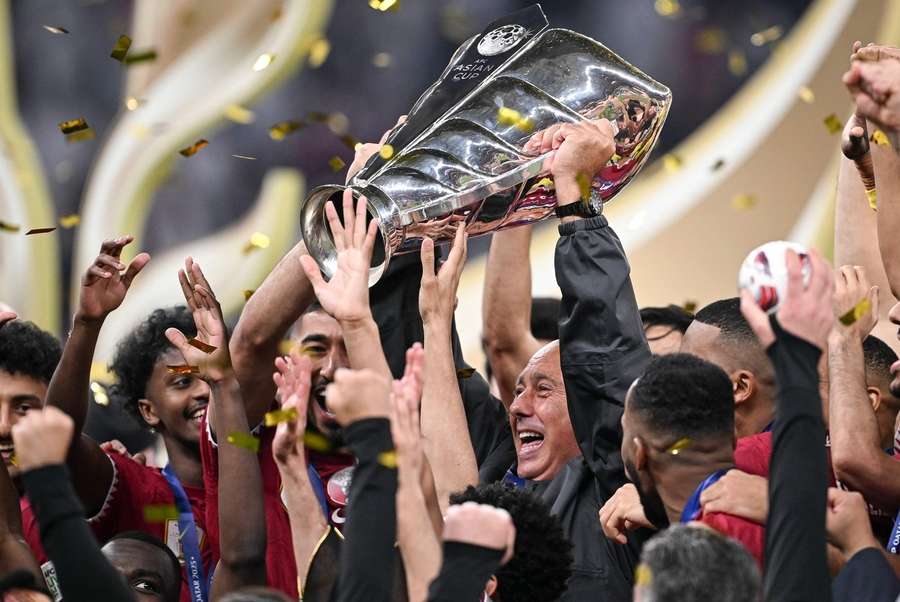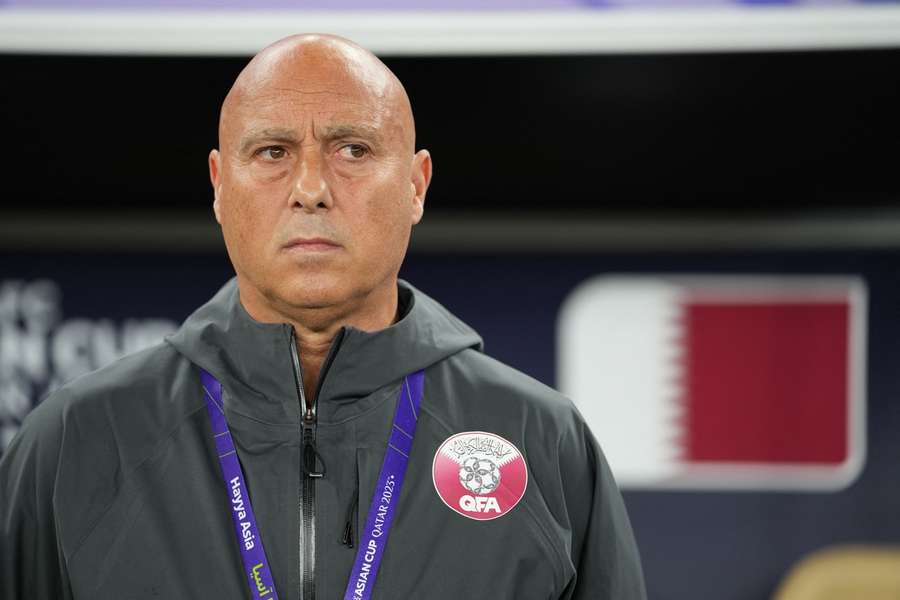EXCLUSIVE: Tintin Marquez on how he led Qatar to the Asian Cup title in two months

After winning the Asian Cup, Tintin Marquez - whom they call 'Mister Lopez' in Doha - is looking to the future, but never forgetting his past. In this exclusive interview, he touches on Qatar's recent triumph, his career in football and life in the Middle East.
"Immediately after the victory everyone wrote to me. All the people who know me know that I was away from home for almost 13 years during which I had disappointments and joys.
"No joy, however, can compare with that of winning the Asian Cup," said Marquez.
Let's start with your past: what type of player were you?
"I was a quality player, but I did little running."
Would you have liked to coach someone like you?
"Yes, because I scored a lot of goals. I was an offensive midfielder who worked little in defence."
You had your first coaching experience in Barcelona, but then you had to go and seek your fortune abroad, right?
"Yes, I spent my entire playing career at Barcelona and then I started coaching a third division team. We were lucky enough to win the Copa Catalunya against Barca. Only then I returned to Espanyol because I thought it would be nice to get it working there. I started in youth football and got as far as the first team, but it didn't go well.
"They fired me and I had to leave. I went to Castellon. (It was) a bad experience."

After that, how did you become the manager of Qatar?
"I first went to Qatar in 2011, but after buying a professional team in Belgium, they sent me there with a project called Football Dreams, which involved recruiting players in Africa. I spent four years there."
Tell us about your decision to become the manager of Iraq.
"They called me to help their coach prepare for the 2016 Olympics. We did three months of preparation and went to Rio, but I was only with them for that period. And then, after St. Truiden again in Belgium, I went back to Qatar."
Why did you return to Qatar?
"Because they called me about a team (Al Wakrah) that was going through a bad period in the Second Division and I could give them a hand. Well, we were lucky enough to get promotion and we managed to qualify for the Champions League in three consecutive seasons. We did a good job there."
So good that Qatar called you to manage the national team when Carlos Queiroz left. On the 6th of December, they appointed you as their coach, on Christmas Eve you conducted your first training session and on the 10th of February you won the Asian Cup. When did you realise you could really win it?
"Well, if I have to be honest, at no point because it is very difficult to win with Qatar. What Felix (Sanchez) managed to do was an incredible thing. To win with Qatar against national teams like Japan, Korea, Australia, and Iran, was almost unthinkable. We played match by match, with enthusiasm, overcoming round after round.
"Maybe when we went up against Iran in the semi-finals we started to think that we could beat Jordan because we had played a friendly against them before the start of the tournament and they seemed like a good team, but we could beat them. Yes, at that moment we started to think that we could win."
First Pep Guardiola, then Xavi Hernandez, Felix Sanchez and now you. Why did you all leave Catalan football for Qatar?
"We had a good feeling with the Qataris because the Spanish character adapts quite well to theirs. Also, they like our philosophy of play: try to keep control of the ball and be offensive.
"Well, not all Spanish coaches are the same. But the idea that spread after the World Cup we won in 2010 and the European Championships in 2008 and 2012 was that in Spain we play offensive football."
What kind of coach have all these experiences around the world made you? Who is Tintin Marquez today?
"The truth is that I still have the same idea of football that I had at Barcelona. I have a little more experience and, therefore, I deal with some situations more calmly, but I continue to develop the same idea that I have taken wherever I have coached. In some places, it has gone well, in others not so well. In this last adventure in Qatar, however, I would say it went fantastic."
Where does football stand in the Middle East?
"Qatar has taken an incredible step forward. In recent years, the players have become much more professional in terms of responsibility, schedules, attendance at training and understanding of the game. They have improved a lot, a lot. Of course, if we compare with Europe, I won't say with the big teams, but even the moderately good ones, they are still far away.
"Having said that, Qatari football is currently in the best place in its history, it is in 34th place in the Fifa rankings and that means that it is already at a high level because the players have improved so much."
Would you like to return to Europe to coach a top team?
"No, no. After Qatar, I will go back home. My intention is that when I finish my job in Qatar I will say 'enough'."
After the last World Cup in Qatar, in 2034 the Cup returns to the Arabian Peninsula, to Saudi Arabia. How far has football come in the Middle East?
"Well, here they are crazy about football. They know all about the Spanish league and the English league. They watch a lot of football. They like football a lot, they like sport a lot. Qatar invests a lot in sport, but not only in football. It invests in, It promotes everything. For example swimming, basketball, athletics, handball, all the sports.
"And then it invests a lot in facilities. It has impressive facilities. Impressive in everything. The truth is that they invest a lot in sport. They really like sport, especially the Emir."
If a young European footballer or an already established player called you to ask your advice on whether or not to come to the Saudi Pro League or any league in the Middle East, what would you say?
"Well, they are coming right now. For example, we have a lot of young people. For example, we have a project in Qatar where they are recruiting 17, 18-year-old players.
"Well, the advice is that football is football everywhere if you compete and you train well - it's professional football. And maybe the advantage is that you earn more here than in Europe."
At the World Cup in Qatar, there has been a lot of criticism about human rights issues, and the condition of workers. Do you think they are justified or do you think the reality in Europe is not yet well known?
"They are 100 per cent unjustified. I always say the same thing, whoever says these things should take a Qatar Airways plane, come to Qatar, stay 15 days and then repeat their opinion, and see what they think.
"These are prejudices that stem from total ignorance."
